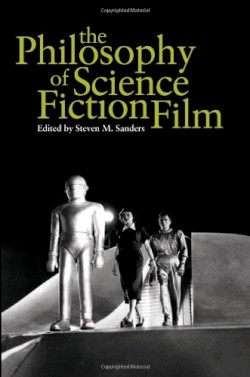The Philosophy of Science Fiction Film
In her classic 1965 essay, “The Imagination of Disaster,” Susan Sontag provided not only a taxonomy of the then newly emerging genre of science fiction films, but also described their philosophical foundations. She observed that the “deepest anxieties about contemporary existence” lurk in the films’ “hopeful fantasies of moral simplification and international unity.”
Philosopher Steven M. Sanders, coeditor of The Philosophy of TV Noir and emeritus professor of philosophy at Bridgewater State College in Massachusetts, and his contributors pick up where Sontag left off in this splendid collection of essays.
The book covers three types of philosophical thinking. First, essays on Metropolis, Frankenstein, and 1984 examine the historical and intellectual context in which the films were conceived. A second set of essays analyzes particular films ranging from The Day the Earth Stood Still to Blade Runner, The Matrix, and Invasion of the Body Snatchers, teasing out the philosophical implications. These essays also explore the ways these films question the nature of personal identity, human agency, and human consciousness. The third set of articles uses one or more films, ranging from Alphaville to The Terminator, to discuss various philosophical problems such as time travel or disenchantment or rebellion.
The most effective essays in the collection combine thoughtful interpretations with clearly articulated and jargon-free description of philosophical topics. For example, Jerold J. Abrams’s essay on Fritz Lang’s Metropolis demonstrates that Lang’s film embodies Adorno and Horkheimer’s ideas about Enlightenment philosophy. “Lang presented perfectly, in some of the greatest moving images ever put to screen, the entire philosophical movement of Adorno and Horkheimer’s Dialectic of Enlightenment—anticipating them by almost two decades… Somehow Lang understood precisely how the Enlightenment would lead directly into absolute madness,” Abrams writes.
Reading Sanders’ marvelous collection, fans of science fiction films will find new and convincing ways of looking at their favorite flicks. For those who aren’t fans of science fiction, the book offers a compelling introduction to the ways the genre reveal deep questions about the human condition.
Disclosure: This article is not an endorsement, but a review. The publisher of this book provided free copies of the book to have their book reviewed by a professional reviewer. No fee was paid by the publisher for this review. Foreword Reviews only recommends books that we love. Foreword Magazine, Inc. is disclosing this in accordance with the Federal Trade Commission’s 16 CFR, Part 255.

